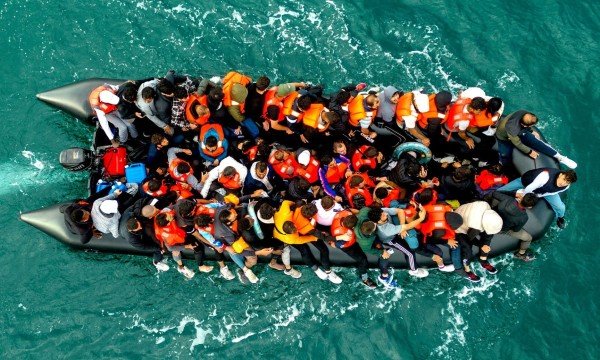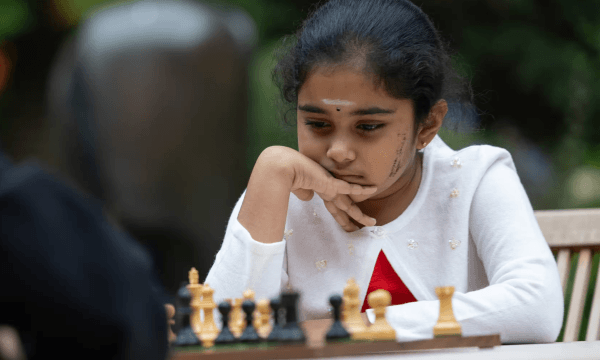
***Know anybody in the global Tamil community with an interesting story or workin on an interesting initiative that we should feature? => FILL OUT THIS FORM ***
Hamsha was born in Sri Lanka and immigrated to Canada at the age of five due to the civil war and currently calls Yellowknife her home. After completing her Bachelor of Science (Hons.) in Zoology and Forest Conservation from the University of Toronto, she followed up with a Masters of Environmental Science in Environment and Resources Studies from the University of Waterloo, where she undertook research on implementing a multistrata agroforestry system in Kilinochchi, Sri Lanka to improve biodiversity and increase food security for impoverished communities in the region. She has also volunteered on various projects in Nigeria ranging from gender equality, land rights, green entrepreneurship, and wildlife conservation, and is currently involved with setting up sustainable farming initiatives in Central America. She is a former board member at the Ontario Council for International Cooperation.
I had the pleasure of chatting with her about her latest initiatives.
How did you become a Wildlife Biologist for the Government of Northwest Territories?
That's a long and winding story but it started when I was really young. I grew up watching wildlife documentaries with appa, and was already naturally inclined to all things wildlife and outdoors. I would spend hours looking at birds and squirrels and observing their movements. I'd climb pine trees (and other trees), to the detriment of my face and arms, just to get a better look at nests. By twelve, I knew most of our urban bird inhabitants. Seeing how I grew up in Toronto, beyond the occasional foxes, raccoons, and mice, I didn't have much else to observe but that didn't stop me from wanting, to one day, cross the Atlantic Ocean and go to Africa. India didn't cross my mind until I started watching documentaries on tigers, and soon after that the country made my hit list too. I always knew that I wanted to go into the sciences, and by the time university applications rolled around, I was able to put a name to my passion. I wanted to become a zoologist and that was that.
I completed my degree at the University of Toronto in Zoology and Forest Conservation and eventually went on to complete my graduate studies at the University of Waterloo in Environmental Science. Somewhere between fourth year and first year in graduate school, I shifted my focus to go from pure wildlife conservation to biodiversity (includes flora and fauna) conservation through sustainable livelihoods, and that took me on a journey to Vanni, Sri Lanka.
The focus of my research was on how to remediate degraded soils in farm lands within a post-war context while also focusing on food security and livelihoods. I worked with farmers to gain a better understanding farm production, and whether implementing an alternative form of agriculture system, such as agroforestry, would improve soil fertility, and thereby increase food security and biodiversity in the region. The goal was for the farmer to become self-sustaining and no longer dependent on agrochemicals for production. Fast forward 2.5 years, I was a newly minted graduate student with absolutely zero work experience other than a handful of contracts on urban forest conservation. That's about when I lost hope. I didn’t quite know how to leverage my degree to my advantage to get work. I was still living with my parents, I was unemployed, and I wasn't contributing to the family in any way. I was still passionate about my field of research, and at one point, emailed over 20 professors to ask them if they would supervise me for my post-graduate degree. I went to a conference on global food security in Ithaca, New York to "shop around" for a professor only to hear that Sri Lanka was too small and nobody worked there, and if I wanted to shift my focus to Ghana or Kenya or Tanzania, I would have better luck. I didn't want to shift my focus. I wanted to go back to Vanni, I wanted to support those farmers make that transition, I didn't want to give up on them because Sri Lanka was small and unlikely to get post-graduate funds. That led to nowhere. That's around the same time I received an email to attend a "how to become a Foreign Service worker" seminar at the Balsillie school of International Affairs at the University of Waterloo.
The seminar, in itself, was eye opening but it was all the volunteer booths outside, specifically the Cuso booth that was the game changer. Next thing you know, I'm in Nigeria, working with UN REDD+ and local environmental NGOS, rescuing mongoose babies from a certain demise, meeting a university professor, catching geckos, frogs, toads, and snakes in a reserve that had forest elephants, living off of peanuts and bananas (Nigeria had no concept of vegetarianism) for who knows how long, and just absorbing so much knowledge. I came back to Canada invigorated. I would like to tell you that, I returned to a great job, but I didn't. I jumped jobs a lot, went into IT for a bit, and just got fed up. A friend of mine, who is working in Nunavut, urged me to apply to jobs up North. I didn't want to. I've heard about the North. Land of ice and snow, and I really despised the cold. Eventually, I did apply. I applied to Nunavut, Yukon, and the Northwest Territories (NWT), and heard back from them. My first job in the NWT didn't have anything to do with wildlife. It focused more broadly on mitigating negative environmental impacts from mining, and there was a steep learning curve on the regulatory processes up here. About 4 months later, an internal expression of interest for a wildlife biologist came up. I informed my boss that I was interested in applying then submitted my CV. And here I am, finally in a role that was closely aligned to something I started pursuing two decades ago.
What does a typical day look like for you?
It really depends on the season. Most of our fieldwork is completed in early Spring to mid-Fall. Things are usually quiet in the winter unless we have to do caribou surveys.
Typically my days start off with emails. Pretty much like every other office job I can think of. On busier days, I usually have interdepartmental meetings discussing wildlife management plans, and the steps required to improve compliance from development companies. On quieter days, I'm usually researching wildlife topics around mine closure and reclamation, zones of influence, and wolf predation influence on caribou population stability. I've participated in three wildlife surveys since I've joined the department; caribou/wolve, raptors, and rodents. Typically surveys can take anywhere from half a day to a full week.
How have you found the move from Toronto (biggest city in Canada) to the Northwest Territories? Has the experience surprised you in any way?
Mentally I looked at moving to the Northwest Territories the same way I looked at moving to Nigeria but with more layers. I still remember landing at the Yellowknife airport wearing my winter parka and being very happy that I did. It was the end of August but it felt like November. It took me a long time to adjust to the quietness of the space. I was used to being "always busy;" attending events, meeting friends, going to workshops, leading workshops, hanging out with family, and suddenly I was in this place where I literally had nothing to do. Nigeria was more palatable in that sense. I binge watched Netflix for a whole month, and this is coming from someone who never had time to watch anything other than the occasional movie, until I got into the rhythm of the city. Yellowknife isn't big. Stouffville is bigger in Ontario. But it's a space that cultivates internal pondering. It really makes you stop and think about what you were doing before and how you want to move forward. It slows you down and allows you to learn a language or pick up a hobby that you didn't have time for before, and this is because there are no external distractions. You have to make your own entertainment. But let's not get too distracted with the Zen-ness of the space. To date, as a vegetarian, I can only eat at one restaurant. God forbid the trucks don't show up on time, because the 4 vegetables I could buy would be out of stock. This place has limited options; if you want something then you have to make it happen. You need to carve out the option for yourself. So in some ways Yellowknife does surprise me because it's not a bad as I thought, the winters aren't that horrible, the people are friendly, I have more time to focus on the things I want to do, and I'm definitely better for it. And, let's not forget you can see the Northern Lights from your balcony!
How did you become involved with Comdu.it? What has been a highlight of the work you’ve done so far personally?
I got involved with comdu.it in 2014 around the same time I was completing my graduate thesis. That's a loaded question. Comdu.it has given me the space to give back to communities in Sri Lanka, which has always been near to my heart. Through comdu.it, I have been able to meet like-minded individual; individuals who are not only passionate but also committed and driven to support sustainable change in Sri Lanka. As the current director of programs and partnerships, I am extremely proud of the initiative undertaken by our team to understand the needs of the local partners and deliver programs and workshops that meet those needs. This can be from anywhere from educating teachers on how to navigate google classroom or better techniques for working with students with special needs, to supporting social entrepreneurships, to mental health counselling etc. Collaborating and engaging with my team member, the volunteers we sent overseas, and the local partners to deliver impactful programs has been the highlight of my work at comdu.it.
Have you recently travelled back to Sri Lanka? If so - tell us about your experience in terms of what you see on the ground.
I haven't been back to Sri Lanka since 2018 so it has been a few years. I spent most of my time in the Vanni area. You wouldn't think only a decade or so before that the war ended. The roads are newly carpeted. All remnants of the tragedy has been erased except when you look up and see the headless palmyra trees or when you're driving and every few meters there is yet another army camp, yet another victory monument. Sri Lanka has done a good job at creating this façade of relative peace. I'm not sure what we would find if that façade cracked. I think we can all imagine. However, I also see resilience and hope. I see people working together to move forward, not to forget but to build something better.
What do you think your “superpower” is - how does somebody find theirs?
I'm very good at seeing opportunities no matter how slim. Look at the thing you do consistently and effortlessly, and that is your superpower.
If you were given $1 billion, how would you allocate the money to change the world?
I'd conduct research, formal surveys, focus groups to determine root causes of issues, and then work collaboratively with grassroots organizations, NGOs, foundations, and corporations to develop a solution that would work for all, then finally allocate the funds accordingly. I don't think $1 billion is enough to permanently change the world because we pour so many trillions into objectives, and still find ourselves stalled on so many fronts. Building partnerships with people and organizations is more likely to bring forward the sustainable change we would like to see. The money will provide us with the leverage to see those changes come to fruition. This is probably not the answer you're looking for but I believe we can go so much further if we build lasting relationships with others, because at the end of the day the world isn't just mine.
What do you think the 16-year old Hamsha would tell the current you? How about what you tell your 16-year-old self?
Don't forget "life begins at the end of your comfort zone" and don't become complacent.
Life isn't short. It's very very long so take your time to figure out how you want to go to where you want to go. There isn't only one way to achieve the things you want to achieve; the path doesn't have to be straight, it can curve around, it can meander, it can speed up, but as long as you're moving towards your goal you're still on track. It's ok if you decide 10 years into something that you absolutely hate what it is you are doing and need to change to something else. It's ok to seek opportunities elsewhere even if it means leaving the country. Redefine success so that it is personalized to you.
What advice would you tell driven, young people to ignore?
Success does not always look like an engineer, lawyer, doctor or teacher. Do what you want to do just be the best at it.
What is your favourite book(s) you’ve read recently and why?
"Sand County Almanac: And Sketches here and there" by Aldo Leopold
I actually read this book a long time ago but it remains one of my favourites to this day. This book exposed me to environmental philosophy and land ethics: "A thing is right when it tends to preserve the integrity, stability, and beauty of the biotic community. It is wrong when it tends otherwise," which has informed the way I think about sustainable development.
"Start with why" by Simon Sinek
I think many of us go through short bursts of anxiety where we no longer understand our position in life. This books helps you really dig down and figure out your why. For example, if you're no longer passionate about the work you are doing, dig down and ask yourself what propelled you to do that work in the first place.
"Man's search for Meaning" by Viktor E. Frankl
I think this quote summarizes the why: " The last of human freedoms—to choose one’s own attitude in any given set of circumstances—to choose one’s own way."
What is a new belief, behavior or habit that has most improved your life?
Learning to say “no”. For example: No, this relationship isn't right for me. No, I'm at my limit as to how much I can do. No, I don't need to internalize external criticism.
What is your favourite Tamil food (meal or dessert)?
It's neither a meal nor a dessert. I am obsessed with chambal. It's versatile and goes with everything else I love like dosai, idli, puttu etc.
What is your favourite Tamil movie?
Bale Pandiya (with Sivaji Gane
What does Tamil culture mean to you?
Tamil Culture to me is like an evolving kaleidoscope, especially when we consider our larger diaspora. We are no longer hemmed by traditional notions of appropriate and inappropriate or typical and atypical. As a collective we are adding and shifting the way we engage with our culture and redefining it to something that is more inclusive and hopeful.
***If you want to connect with Hamsha, please reach out via her TC profile - https://tamilculture.com/user/Hamsha-Pathmanathan***
Related Articles:
"These Tamil Entrepreneurs Share How They Grew Their Side Hustles"
"Diaspora Tamils React to Netflix's 'Indian Matchmaking'"
"Angel Investor Jay Vasantharajah On Building His Portfolio One Day At A Time"
"Danny Sriskandarajah's Journey From Rural Sri Lanka to CEO of Oxfam Great Britain"
"Coronavirus Took My App From Our Lives"
"This Toronto-Tamil Family Is Living Minimally To Maximize Their Quality of Life"
17-Year-Old Anjalee Narenthiren is the Founder of Not One, But Two Companies

























